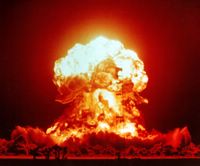 Japan could go nuclear within a short period of time if it wanted: they have the technology, the money and the ressources. That was true already for decades, but the Japanese government was missing the will, determination and several factors lead even to a rejection of an offer by the United States (read below) and led finally to the ratification of the Nuclear Non-proliferation Treaty in 1976.
Japan could go nuclear within a short period of time if it wanted: they have the technology, the money and the ressources. That was true already for decades, but the Japanese government was missing the will, determination and several factors lead even to a rejection of an offer by the United States (read below) and led finally to the ratification of the Nuclear Non-proliferation Treaty in 1976. IPS News reports:
"The declaration on Thursday warns that Japan's plan to separate and stockpile up to eight metric tons of plutonium annually, enough to make 1,000 nuclear bombs, calls into question Japan's commitment to strengthening the NPT. [...]
With Rokkasho operational, by 2020 Japan's domestic stock of plutonium could equal the U.S. stockpile of plutonium for weapons," said Frank von Hippel, physicist and professor at the Science and Global Security Programme at the U.S.-based Princeton University.
Anti-nuclear lobbyists are worried that the safeguards at Rokkasho would be inadequate to prevent the deliberate diversion or theft of large quantities of plutonium.
"Separated plutonium poses a risk of theft, and such large stocks would be destabilising," Von Hippel said in the report.
In 1967, Prime Minister Sato commissioned a study on Japanese nuclear policy to examine whether it was possible and desireable to develop nuclear capabilities. The study concluded, that it would cost too much, it would alarm neighboring countries and would not have the support of the public. In November 1971, a White House official told Keizai Editor Yasuo Takeyama that
"if Japan wishes, the U.S. ist prepared to provide Japan nuclear warheads or the know-how to manufacture nuclear warheads." (source: Japan's Nuclear Future: The Plutonium Debate and East Asian Security, 1996)
Interesting enough, the United States joined the Nuclear Non-proliferation Treaty in 1968, three years earlier. In 1972, President Nixon stated that
"I think it will be a safer world and a better world if we have a strong, healthy United States, Europe, Soviet Union, China, Japan, each balancing the other, not playing one against the other, an even balance."
The idea of mutual deterrence by possession of nuclear weapons in the case of the U.S. and China or Russia didn't help Japan too much, in the contrary:
An authoritative study concluded in 1966 that it would be "highly unthinkable" for the United States to risk a nuclear exchange with Russia or China for the sake of Japan. The Communist powers could use Japan as a hostage to deter and American attack, the study said, and there would be "little practicle meaning" in the destruction of Communist cities after "Tokyo and Osaka had been turned into a second Hiroshima and Nagasaki."
Since the end of the Cold War the world changed, but the statement is not less true than it was in 1966: If there were a nuclear attack on Japan, the - complete or partly - nuclear destruction of the attacker by the U.S. would still have "little practicle meaning". Japan overcoming its "nuclear allergy" and actually developing nuclear weapons (never mind Article Nine of the Japanese constitution) could trigger a new arms race instead and destabilize the whole region.
Japan's Nuclear Dream Could Be World's Nightmare
» Post a Comment